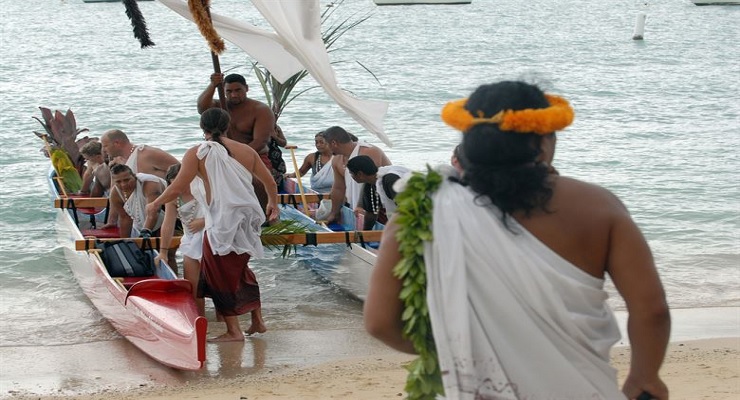
From Voice of America
The U.S. Civil Rights Commission recently recommended Congress officially recognize Native Hawaiians, making them eligible for the same government-to-government relationship and benefits given to hundreds of Native American tribes.
But many Native Hawaiians reject that idea and say they won’t settle for anything less than complete independence and control of more than a million acres of land.
Polynesian navigators first discovered the Hawaiian Islands more than a millennium ago, and for the next 1,000 years, flourished as a self-sustaining and self-governing people.
In 1840, Hawaii’s king Kamehameha III established a constitutional monarchy and later opened up Crown lands for private ownership. Native Hawaiians, whose population had already been decimated by introduced diseases, were now displaced from the land to make way for a prosperous sugar cane industry that came to be dominated by American planters.
In 1887, U.S. and European oligarchs forced King Kalakaua to sign a constitution that stripped him of his authority, removed Native Hawaiians’ land rights and allowed foreign landowners the right to vote.
In 1893, Kalakaua’s successor, Queen Liliuokalani, tried to draft a new constitution to restore the monarch’s power. The planters, with help from John Stevens, the U.S. Minister to the Kingdom of Hawaii, and a contingent of U.S. Marines, forced Liliuokalani from the throne and imprisoned her. Five years later, the U.S. Congress annexed Hawaii as a territory, and in 1959, named it the 50th U.S. state.
“Then there was a huge rush of settlement by U.S. citizens that coincided with the growth in jet travel,” said Noelani Goodyear–Ka’opua, a Kanaka Maoli (Native Hawaiian) scholar and expert in Native Hawaiian social movements. “After statehood, you had this a massive influx of people, which resulted in a boom in development of housing developments and hotels, leading to even more land struggles.”
Calls for sovereignty
The U.S. government acknowledges Native Hawaiians as “a distinct and unique indigenous people with a historical continuity to the original inhabitants” of Hawaii. But Congress has never formally recognized them as it has 573 Native American tribes and nations, and Native Hawaiians have never established a formal government.
Native Hawaiians today, like Native Americans on the continent, are politically and economically marginalized. Prior to the arrival of Europeans, they numbered up to a million. Today, they represent only about 20 percent of the state’s population and experience discrimination, high rates of poverty and homelessness, and disparities in health and longevity.
But the Kanaka Maoli, as Native Hawaiians call themselves, didn’t take colonization sitting down. Even before annexation, they were organizing, petitioning and resisting, according to Ka’opua. And the sovereignty movement, always simmering, began to solidify after the 100th anniversary of overthrow, when thousands of Native Hawaiians rallied at Iolani Palace, former home of the monarchy.
“From that point, there were really two parallel streams of the movement,” said Ka’opua. “One is seeking more of a nation within a nation, that is, federal recognition status. The other is asserting the claim for a country independent from the United states.”
‘A lesser deal’
In 1993, Congress apologized to Native Hawaiians for its role in overthrowing the monarchy and committing itself to a process of reconciliation. To that end, in 2014, the U.S. Department of the Interior (DOI) held a series of hearings across Hawaii, giving hundreds of Native Hawaiians a platform to express their opinions on federal recognition.
Transcripts of the hearings reveal that the vast majority of those who testified oppose recognition, arguing the overthrow violated international law and the kingdom, in fact, never stopped existing. Watch video of one of those meetings in Waimea, Hawaii, July 3, 2014 (below).
In 2016, the DOI released a final rule to create a framework for formal recognition if Native Hawaiians form a unified government and call for a government-to-government relationship with the U.S.
“If you look at that final rule, it basically says no federally controlled lands are on the table,” said Ka’opua. “How is this in any way to our benefit? We wouldn’t even be getting the crappy deal that Native American nations have. And once you accept a lesser deal, a better deal is impossible.”
Indigenous or race group?
Davianna Pomaika’i McGregor, a Hawaii historian and founding member of the Department of Ethnic Studies at the University of Hawaii, Manoa, views federal recognition as an important step in the right direction toward full sovereignty.
“The acknowledgment of Native Hawaiians as indigenous people with the right of self-governance has nothing to do with acknowledging the independence of Hawaii,” she said. “They are two separate issues, and one does not preclude the other.”
Congress has passed dozens of statutes that recognize a special obligation to Native Hawaiians, and provide for health, education, job and other funding. But McGregor said these programs are vulnerable to court challenges.
“I’m very much in favor of reorganizing our government as a native people, not the government of the state of Hawaii as a whole, but the quest to reestablish an independent Native Hawaiian government within an independent Hawaii,” said McGregor. “But I don’t think that’s going to happen in my lifetime.”
Rob says
The US & many other Western Nations fund Israel’s military & economy which displaces Palestinians to make room for settlements in the Occupied Territories & gives Israeli Arabs less than equal rights, It also gives Sephardic Jews & Black Jews fewer rights than White Jews although they are guaranteed equal rights under the law.
The US won’t give Hawaii independence and it was made a state going against the wishes of the Native Hawaiians. 2009 was Hawaii’s 50th anniversary of statehood and last year 2019 was Hawaii’s 60th anniversary of statehood and many Native Hawaiians were in no mood to celebrate.